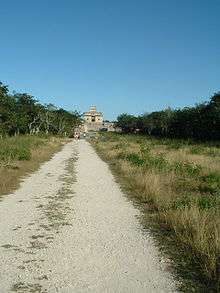Sacbe


A sacbe, plural sacbeob (Yucatec Maya: singular sakbej, plural sakbejo'ob), or "white way", is a raised paved road built by the Maya civilization of pre-Columbian Mesoamerica. Most connect temples, plazas, and groups of structures within ceremonial centers or cities, but some longer roads between cities are also known. The term "sacbe" is Yucatec Maya for "white road"; white because they were originally coated with limestone stucco, which was over stone and rubble fill.
Many sacbeob can be seen by modern visitors to Maya sites; perhaps the most familiar is the one in Chichen Itza running from the main group around El Castillo to the Sacred Cenote, which is traveled on by thousands of tourists daily. Few of the longer roads still exist in their entirety. A well known sacbe connects Uxmal with Kabah, which is marked by corbel arches at either end. The 62-mile-long (100 km) road connecting the ancient cities of Coba and Yaxuna was for decades the longest known to archaeologists. The remains of an even longer route have recently received the attention of archaeologists. This long sacbe apparently ran from the site of Ti'ho (modern Mérida, Yucatán), through such sites as Ake and Izamal, to the Caribbean Sea near modern Puerto Morelos, a total distance of some 300 km.
While the longer roads could be used for trade and communication, all sacbeob apparently had ritual or religious significance as well. Travel writer and early Mayanist John Lloyd Stephens reported that some local Maya people in Yucatán still said a short ritual prayer when crossing a sacbe in the early 1840s, even though they had been overgrown with jungle for centuries at the time.
While the sacbeob in the Yucatán are the best known, they are documented throughout the Maya area. Some appear to have been built as early in Maya history as the Pre-Classic; a number have been found around El Mirador.
In modern times, some of the ancient sacbeob have been used as bases or incorporated into modern highways and railway lines.